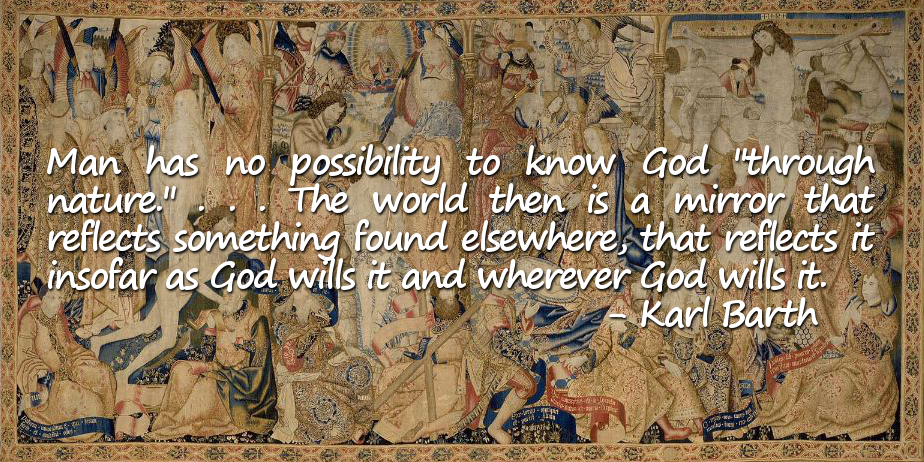
Karl Barth gave a series of lectures on the Apostles' Creed from 1940 to 1943 that were recorded with a stenographer and then published with Barth's permission in a book titled, The Faith of the Church: A Commentary on the Apostles' Creed according to Calvin's Catechism. As the title indicates, Barth's lectures were a commentary on John Calvin's exposition of the Apostles' Creed from the 1545 Latin edition of the Geneva Catechism (see P. Schaff's helpful introduction to the Geneva Catechism.) Barth provides each of Calvin's questions and answers on the Apostles' Creed from the Geneva Catechism and then provides his exposition of the respective question and constructive criticism of Calvin's answers.
Many of Barth's controversial views appear in The Faith of the Church, including his position on the Virgin Birth and the Resurrection, and even his famous nein to Natural Revelation that I've provided in the following quotation. Calvin's question and answer's are in italics, with Karl Barth's response immediately following.
John Calvin
Question 25. Why do you add: Maker of heaven and earth? -- Because he manifested himself to us through his works, and in them he is to be sought by us (Psalm 104; Rom 1:20). For our mind is incapable of entertaining his essence. Therefore there is the world itself as a kind of mirror, in which we may observe him, in so far as it concerns us to know him.
Karl Barth
We cannot know God in his essence. "No man can see my face and live." But God makes himself known to us in the world. Here we must make several clarifications in order to avoid some big mistakes.
First of all, the world, creation, is not a part of God as the Gnostics used to represent it. The world is not an emanation from God, but the putting into being of something different from God, which is over and against God. If the world were divine in itself, it could not be said: God loves the world, for then God would be loving himself and remain alone. Love signifies: relationship between two really different beings. The world is then a reality in itself, a proof of the mercy of God who agrees to the existence of something outside of himself. There is an absolute imparity between God and the world, but, within this imparity, there is a hyphen: creation depends on God. God upholds creation and God judges what is good and what is evil. There is no good and evil "in itself," but God judges good and evil. And the sin of man consists precisely in the fact that he himself wants to judge what is good and what is evil.
Next, what is the nature of the knowledge of God which is given us in the world? Let us beware now: Man has no possibility to know God "through nature."
There is no knowledge of God which was given along with the existence and the essence of the world. We ourselves cannot say: God is in the world here or he is there. But God himself is he who, in the world, gives himself to our knowledge, according as he pleases. We notice with what reservations Calvin speaks of this knowledge the world does not stand witness of God but insofar as God wills it and wherever he wills it. It is not the history of any people which witnesses unto God, but the history of Israel, the Bible and Jesus Christ belong to the world. The world then is a mirror that reflects something found elsewhere, that reflects it insofar as God wills it and wherever God wills it.
Barth, Karl. Ed. Jean-Louis Leuba. The Faith of the Church: A Commentary on the Apostle's Creed According to Calvin's Catechism. Trans. Gabriel Vahanian. New York: Meridian, 1963. 48-49. Print.
Header Image Source: "First Four Articles of the Creed tapestry" by Unknown - mfa.org/collections/object/tapestry-the-first-four-articles-of-the-creed-37377. Licensed under Public Domain via Wikimedia Commons.
Related: Geneva Catechism, John Calvin, Karl Barth, Natural Revelation, The Faith of the Church, The Faith of the Church: A Commentary on the Apostles' Creed according to Calvin's Catechism, Virgin Birth



Leave a comment